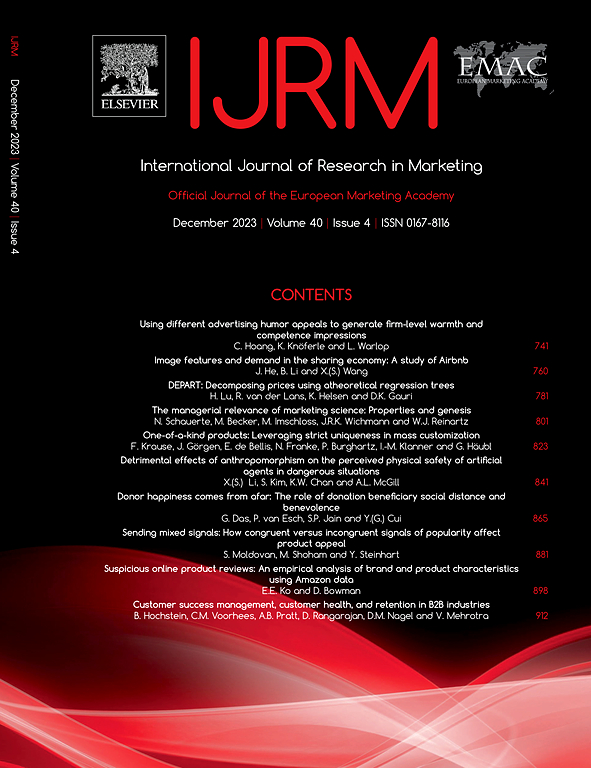创意家在创新竞赛中的成功:参与、效率还是压力?
IF 7.5
2区 管理学
Q1 BUSINESS
International Journal of Research in Marketing
Pub Date : 2025-06-01
DOI:10.1016/j.ijresmar.2024.09.003
引用次数: 0
摘要
创新竞赛的成功关键取决于创意者的特质。作者测试了三个重要的属性:参与度(即一次构思vs连续构思),生产力(提交的想法数量)和时间压力(接近截止日期)。这些数据来自为大公司举办的九场固定时间的创新竞赛。研究结果和贡献如下:首先,虽然先前的研究强调固定或自我选择,但我们发现技能的多样性(a)导致连续参与(b)有利于成功。其次,虽然先前的研究在生产力方面得出了相互矛盾的结果,但我们发现,在创新竞赛中提交的先前累积想法的数量对连续而非一次性创意者的成功有积极影响。然而,一天内提交的想法数量会对所有创意者的成功产生负面影响。第三,虽然之前的研究强调了截止日期对于避免拖延的重要性,但我们发现,截止日期会导致想法激增,想法数量急剧增加,但质量却在下降。在最短的创新竞赛中,匆忙现象最为明显。本文章由计算机程序翻译,如有差异,请以英文原文为准。
Ideators’ success in innovation tournaments: Participation, productivity, or pressure?
Success in innovation tournaments depends critically on ideators’ attributes. The authors test three important attributes: participation (i.e., one-shot vs. serial ideators), productivity (number of ideas submitted), and time pressure (approaching deadline). The data come from nine fixed-time innovation tournaments conducted for large corporations. Findings and contributions are as follows: first, while prior research has emphasized fixation or self-selection, we find that a diversity of skills (a) leads to serial participation and (b) favors success. Second, while prior research has led to contradictory results on productivity, we find that the number of prior cumulative ideas submitted within an innovation tournament positively affects success for serial but not one-shot ideators. However, the number of submitted ideas on a single day negatively affects success for all ideators. Third, while prior research has emphasized the importance of deadlines to avoid procrastination, we find that deadlines lead to rushing of ideas with a steeply increasing number of ideas but declining quality. The phenomenon of rushing is highest in the shortest innovation tournaments.
求助全文
通过发布文献求助,成功后即可免费获取论文全文。
去求助
来源期刊
CiteScore
11.80
自引率
4.30%
发文量
77
审稿时长
66 days
期刊介绍:
The International Journal of Research in Marketing is an international, double-blind peer-reviewed journal for marketing academics and practitioners. Building on a great tradition of global marketing scholarship, IJRM aims to contribute substantially to the field of marketing research by providing a high-quality medium for the dissemination of new marketing knowledge and methods. Among IJRM targeted audience are marketing scholars, practitioners (e.g., marketing research and consulting professionals) and other interested groups and individuals.

 求助内容:
求助内容: 应助结果提醒方式:
应助结果提醒方式:


